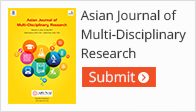Effect of Different Rice Straw Management Strategies for Sustainable Weed Management in Transplanted Rice
K. Arivukkarasu, S. Arivazhagan| Journal Title | : | Asian Journal of Multidisciplinary Research |
|---|---|---|
| DOI | : | DOI: http://dx.doi.org/10.20468/ajmdr.2019.5.1.02 |
| Page No | : | 5-7 |
| Volume | : | 5 |
| Issue | : | 1 |
| Month/Year | : | 3/2019 |
Keywords
Bispyribac sodium, Rice, Rice straw, Weed management
Abstract
Field experiments were conducted at the experimental farm, Department of Agronomy, Annamalai University in Samba (September–January) season, to study the effect of off-season land management practices with weed control measures on the weed flora and crop performance of rice. Off-season land management practices and crop weed control measures had significant interaction on weed parameters and crop parameters. Incorporation of rice straw at 5 t/ha in the field in 40 days before transplanting in the preceding off-season followed by hand weeding twice in the succeeding rice crop performed significantly superior with the least weed dry matter production, highest weed control index, and highest grain yield. However, this was on par with the treatments, namely, incorporation of rice straw at 5 t/ha in the preceding off-season followed by post-emergence application of bispyribac sodium at 0.035 kg/ha and by incorporation of rice straw at 5 t/ha in the preceding off-season followed by post-emergence application of bispyribac sodium at 0.025 kg/ha instead of straw burning in rice crop. Hence, the study reveals that integration of rice straw incorporation at 5 t/ha in the preceding season as off-season land management practice, followed by any one of the weed control measures i.e. either by hand weeding twice or by post-emergence application of bispyribac sodium at 0.035 kg/ha or by postemergence application of bispyribac sodium at 0.025 kg/ha in the succeeding rice crop could be a sustainable weed management strategy in transplanted rice, instead of rice straw removal or rice straw burning.


